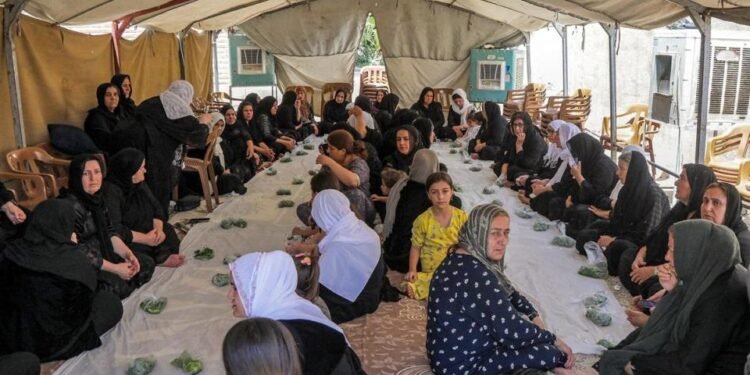Arbil: Waiting at home in Iraqi Kurdistan, Khadija Hussain hopes to hear from the survivors of the shipwreck that took 11 members of her family from neighboring Turkey.
Khadija Rebwar’s niece, her son-in-law Mojdeh and their two families were on a sailboat that sank overnight off the coast of Italy on Sunday and Monday.
After the ship capsized 120 nautical miles off Calabria, 12 people were pulled from the water, one of them dead. More than 60 people are still missing after six bodies were pulled from the sea by the Italian coast guard on Wednesday.
“It’s clear that Mojdeh is alive, we told him on the phone,” the 54-year-old housewife told the AFP news agency.
Mojdeh’s son and one other child from the family are known to have survived – Khadijah’s eight other relatives who were on board remain unidentified.
A poster on the wall at the entrance to the family’s home in Arbil, the capital of the autonomous Kurdistan region in northern Iraq, announces a vigil on Wednesday to express their condolences.
Two family photos show the victims, parents and children, wearing their best clothes, smiling broadly. Mojdeh and her taxi driver husband Abdel Kader. Hiro’s sister poses with her blacksmith husband Rebwar.
Two couples changed their minds and decided not to return.
“They told the parents and everyone was relieved,” Khadija said, but the group had a change of heart after the smuggler’s determined intervention.
He had to contact family in Arbil when he arrived in Europe to start his new life.
“A few hours passed and we didn’t hear anything else,” said Khadija.
The drug dealer turned off his phone
Reports of similar deaths in the European migrant region have become commonplace in the autonomous Kurdish region. Other disasters affected areas in the English Channel or the frozen forests of Belarus.
In an Arbil school where vigils are required, dozens of women gathered under a tent, all dressed in black, their features drawn, while children cried in silence.
At the mosque, family members listened to verses from the Quran and welcomed dozens of guests who came to pay their respects in the reception hall.
Kamal Hamad, Rebwar’s father, explained that on Wednesday, June 12, he boarded the ship and spoke to his son. His sadness was compounded by a misunderstanding.
“They know very well that traveling by sea this way means certain death,” the 60-year-old said. “Why go back?
In volatile Iraq, the Kurdish region has always represented relative prosperity and stability. Property developments, highways, universities and private schools are under construction.
But the autonomous region, like the world’s richest countries, suffers from endemic corruption, cronyism by ruling clans and an economic situation that disappoints the youth.
According to a 2022 Gallup poll, two out of three Kurdish citizens have difficulty finding work.
According to the International Organization for Migration, 3,155 migrants died or went missing in the Mediterranean Sea last year.
Bakr Ali, president of the Association of Returned Migrants from Europe, told AFP that the yacht was carrying “most Kurds from Iraq and Iran”.
“There were also some Afghans,” he said, adding that the ship had departed from Bodrum, Turkey.
Baghtyar Kader, Rebwar’s cousin, said about 30 people from autonomous Kurdistan were among those who left on the ship.
Two couples do not understand. Especially when he “has his own house, car, kids and a job.”
“I try to talk about it, as well as his parents and friends.”
“But they don’t listen,” said the 40-year-old, dressed in black and with a beard.
“They do not know that death awaits them.”





















